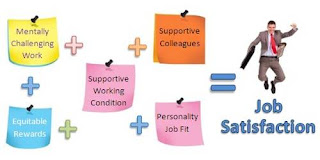JOB SATISFACTION
JOB SATISFACTION
Job
satisfaction is defined as an employee who is self-motivated, content, and
satisfied with his or her job. Job satisfaction occurs when an employee
believes he or she has job stability, career advancement, and a comfortable work-life
balance.
Despite its widespread
use in scientific research and everyday life, there is still no general
agreement on what job satisfaction is. In fact, there is no definitive concept
of what a job entail. As a result, before defining job satisfaction, the nature
and significance of work as a universal human activity must be regarded.
Different authors take
various approaches to defining job satisfaction. Following is an examination of
the most frequently cited definitions of job satisfaction.
Job satisfaction as
any combination of psychological, physiological, and environmental factors that
leads a person to say truthfully, "I am satisfied with my job."
(Hoppock, 1935). According to this approach, while job satisfaction is
influenced by many various influences, it remains an internal factor that has
to do with how the employee feels. That is, job satisfaction entails a number
of factors that contribute to a sense of fulfillment.
job satisfaction focuses on the employee's role in the workplace. Thus, he defines job satisfaction as individuals' effective orientations toward the work roles that they are currently occupying (Vroom, 1964).
EFFECTS OF JOB SATISFACTION
Job satisfaction has a
wide range of effects on various aspects of organizational life. This text
examines some of them, such as the impact of job satisfaction on employee
productivity, loyalty, and absenteeism.
According to the
overwhelming body of research, there is no strong link between satisfaction and
productivity. Satisfied employees are not always the most productive. There are
numerous moderating variables that could be considered, the most important of
which appears to be Rewards. People will be satisfied if they receive rewards
that they believe are equitable, and this is likely to result in higher
performance. Furthermore, recent research evidence suggests that satisfaction
may not always be the case. It does not lead to individual performance
improvement, but it does lead to improvements at the departmental and
organizational levels. Finally, it is still debatable whether satisfaction
leads to performance or performance leads to satisfaction. (Luthans, 1998).
CONCLUSION
Employee satisfaction
is a term that describes whether or not employees are happy and comfortable at
work and are able to meet their needs and expectations. Employee satisfaction
can also be based on an individual's job experience or the quality of their
professional life. Employee satisfaction
is well recognized in terms of its relationship with some key factors, such as
well-being, stress at work, control at work, working conditions, and so on.
Employee satisfaction is based on how the organization treats them, and
efficient employee satisfaction for employees represents from the emotional
feelings they have about their job.
REFERENCES
Hoppock, R., (1935).
Job Satisfaction, Harper and Brothers, New York, p. 47
Luthans, F., (1998).
Organizational Behavior, 8 Edition, McGraw-Hill/Irwin, Boston, p. 147
Vroom, V.H., (1964).
Work and motivation, John Wiley and Sons, New York, p.99





Hi Madushani. Job satisfaction is the sense and awareness of a worker regarding his/her work and how he or she feels well in an organization. It indicates the extent of employees' positive or negative feelings towards their jobs and organizational behavior tried to improve it. Thank you for sharing this article.
ReplyDeleteUnquantifiable measures Job satisfaction is described as a pleasant emotional reaction you have while doing your job or being present at work. Leading businesses are increasingly attempting to quantify this emotion, with job satisfaction surveys becoming standard practice in most workplaces. It's crucial to note that job happiness differs from person to person, and what makes one person happy at work may not apply to another.
ReplyDeletevery good article Madu.If employees are more satisfied with their job, they are less likely to leave. It also helps to recruit better quality talent as new talent sees employee staying power as added value.
ReplyDeleteJob satisfaction is defined as the level of contentment employees feel with their job. This goes beyond their daily duties to cover satisfaction with team members/managers, satisfaction with organizational policies, and the impact of their job on employees' personal lives.
ReplyDeleteJob satisfaction is the key driving tool for the self motivation. Satisfaction on their own task is an emotion, that would infuse more positivity to the work environment. Pump positive vibes, share positive thoughts, and talk positive things are the key characteristic of a satisfied and motivated employee. Such employee support to improve the organizational culture in to next level.
ReplyDeleteThanks for sharing this interesting article Madhushani.
Job satisfaction is the collection of feeling and beliefs that people have about their current job. Increased job satisfaction creates harder working employees. This includes employees overall psychological well-being including your sense of identity, health, overall happiness. Madhushani, your article outlines the key definitions to job satisfaction, the main theories associated with explaining job satisfaction, as well as the types and issues very well.
ReplyDeleteHi Madushani.This principle states that pride and dissatisfaction are pushed by using different factors – motivation and hygiene elements, respectively. An employee's motivation to work is constantly related to job satisfaction of a subordinate.
ReplyDeleteFor an employee, this is a critical component. He or she cannot be a part of a particular company if he or she is not satisfied with his or her employment. Either the organization or the employee must develop appropriate strategies to develop employee motivation and job satisfaction, or the employee must find a suitable working environment in which he or she may continue to work. You've stated everything clearly and provided evidence to back it up. Madushani, thank you for sharing.
ReplyDeleteJob Satisfaction is a feeling of employee on their job, satisfied employees are resourceful asset to the organization and the productive will be very high. Every organization should have the effective motivational strategy based on their nature of business. This reduce the high turnover increase the reputation as well.
ReplyDelete